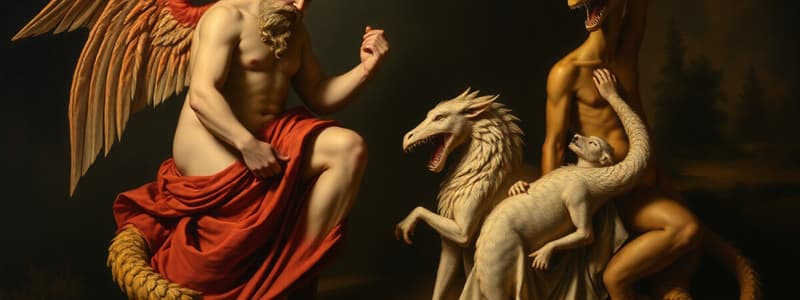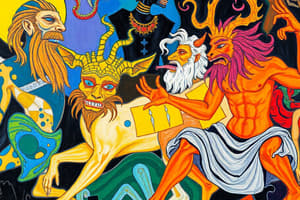Podcast
Questions and Answers
What is a common theme in the stories of heroes within mythology?
What is a common theme in the stories of heroes within mythology?
- Isolation from society
- The fall of the gods
- Rejection of human virtues
- The hero's journey (correct)
Mythological stories highlight the insignificance of human virtues such as courage and loyalty.
Mythological stories highlight the insignificance of human virtues such as courage and loyalty.
False (B)
Name one literary device commonly used in mythological stories to enhance depth.
Name one literary device commonly used in mythological stories to enhance depth.
Simile or metaphor
Match the following literary devices to their descriptions:
Match the following literary devices to their descriptions:
Which of the following gods is known as the god of the sea?
Which of the following gods is known as the god of the sea?
Demeter is the goddess of wisdom and warfare.
Demeter is the goddess of wisdom and warfare.
What is the name of the hero known for slaying the Minotaur?
What is the name of the hero known for slaying the Minotaur?
Hades is the god of the ______.
Hades is the god of the ______.
Match the following major Greek gods and goddesses with their domains:
Match the following major Greek gods and goddesses with their domains:
Which theme explores characters facing predetermined paths or the consequences of their choices?
Which theme explores characters facing predetermined paths or the consequences of their choices?
Medusa was a gorgon whose gaze turned people to stone.
Medusa was a gorgon whose gaze turned people to stone.
Which literary device is used to vividly describe settings or characters in Greek mythology?
Which literary device is used to vividly describe settings or characters in Greek mythology?
The trickster archetype in Greek mythology often represents order and stability.
The trickster archetype in Greek mythology often represents order and stability.
Name one theme that explores the conflicts between destiny and free will in Greek myths.
Name one theme that explores the conflicts between destiny and free will in Greek myths.
Divine retribution is a recurring theme that deals with justice and ______.
Divine retribution is a recurring theme that deals with justice and ______.
Match the following character archetypes with their descriptions:
Match the following character archetypes with their descriptions:
What literary device is used when an object or action is given deeper significance?
What literary device is used when an object or action is given deeper significance?
Epithets are brief descriptive phrases that highlight characters' specific traits.
Epithets are brief descriptive phrases that highlight characters' specific traits.
Provide an example of a literary device used in the 'Odyssey'.
Provide an example of a literary device used in the 'Odyssey'.
Flashcards
Literary Devices in Myths
Literary Devices in Myths
Literary devices like similes and metaphors are used to enhance the storytelling, adding layers of meaning and symbolic representation.
Recurring Patterns in Myths
Recurring Patterns in Myths
Myths often follow a pattern, like the hero's journey, where a character faces a challenge, goes on a quest, and returns transformed.
The Role of Gods in Myths
The Role of Gods in Myths
Myths frequently explore the power of the gods and the consequences of humans challenging their authority.
Mythological Cycles
Mythological Cycles
Signup and view all the flashcards
Human Virtues in Myths
Human Virtues in Myths
Signup and view all the flashcards
Greek Mythology
Greek Mythology
Signup and view all the flashcards
Origins of Greek Myths
Origins of Greek Myths
Signup and view all the flashcards
Influence of Greek Myths
Influence of Greek Myths
Signup and view all the flashcards
Who is Zeus?
Who is Zeus?
Signup and view all the flashcards
Who is Hera?
Who is Hera?
Signup and view all the flashcards
Fate and Free Will
Fate and Free Will
Signup and view all the flashcards
Love, Loss, and Grief
Love, Loss, and Grief
Signup and view all the flashcards
Ethical Dilemmas
Ethical Dilemmas
Signup and view all the flashcards
Epithets
Epithets
Signup and view all the flashcards
Archetypes
Archetypes
Signup and view all the flashcards
Allusions
Allusions
Signup and view all the flashcards
Imagery
Imagery
Signup and view all the flashcards
Symbolism
Symbolism
Signup and view all the flashcards
The Hero
The Hero
Signup and view all the flashcards
The Villain
The Villain
Signup and view all the flashcards
The Trickster
The Trickster
Signup and view all the flashcards
Study Notes
Greek Mythology
- Greek mythology encompasses a vast collection of stories, poems, and traditions focused on gods, goddesses, heroes, monsters, and mythical creatures. It forms a foundational aspect of Greek culture.
- The stories explain natural phenomena, cultural values, and human experiences. Metaphors and symbolism are key narrative devices.
Origins and Influence
- Many Greek myths originated in oral traditions, passed down through generations.
- Written accounts significantly influenced Western literature, art, and philosophy, continuing to affect us today.
- Myths explain the origins of the world, the evolution of gods, and the relationship between the divine and human. They illustrate human behavior, virtues, and vices.
Major Gods and Goddesses
- Zeus, king of the gods, is associated with thunder, lightning, law, order, and justice.
- Hera, Zeus' wife, represents marriage and family, famed for jealousy and wrath.
- Poseidon, god of the sea, earthquakes, and horses.
- Hades, god of the underworld.
- Demeter, goddess of agriculture and fertility.
- Apollo, god of music, poetry, prophecy, healing, plague, archery, and the sun.
- Artemis, goddess of the hunt, wilderness, and childbirth.
- Athena, goddess of wisdom, warfare, and crafts.
- Aphrodite, goddess of love, beauty, and pleasure.
- Ares, god of war.
- Hephaestus, god of fire, metalworking, and crafts.
- Hermes, god of trade, travel, and thieves.
- Hestia, goddess of the hearth and home.
Heroes and Monsters
- Heracles, renowned for his superhuman strength and twelve labors.
- Theseus, a legendary hero known for slaying the Minotaur.
- Odysseus, the cunning hero of the Odyssey, known for his epic journey home.
- Perseus, slayer of Medusa.
- Jason and the Argonauts, heroes seeking the Golden Fleece.
- Minotaur, a monstrous creature with a bull's head and a man's body.
- Medusa, a gorgon whose gaze turned people to stone.
- Hydra, a multi-headed serpent.
- Cerberus, the multi-headed dog guarding the gates of the Underworld.
Important Themes
- Fate and free will are crucial elements in many Greek myths.
- Love, loss, and grief are explored deeply within family relationships, often resulting in tragic narratives.
- Ethical dilemmas arise, testing characters' morality.
- The power of gods and the consequences of challenging them are recurring themes.
- Human virtues like courage, loyalty, and wisdom are frequently highlighted.
Key Literary Devices
- Metaphors, similes, and personification are used to convey narratives.
- Epithets, like "swift-footed" Achilles, emphasize characteristics.
- Archetypes, such as the hero's journey, trickster, and outcast, recur consistently.
Narrative Devices in Greek Mythology
- Allusions to prior myths or events establish connections.
- Imagery enriches narratives with vivid descriptions.
- Symbolism imbues objects, animals, or actions with deeper meaning.
Mythological Cycles
- Intertwined stories form cycles, affecting one another.
- The hero's journey is a recurring pattern.
- Gods significantly influence the fate of heroes and mortals.
Character Archetypes
- Hero: Characters often embody the hero's journey.
- Villain: Characters demonstrating flaws.
- Trickster: Characters employing deception, like Hermes.
- Outcast: Figures rejected or facing adversity.
Mythological Themes
- Fate and Free Will: Conflicts between predetermined destiny and choice.
- Justice and Punishment: Divine retribution for immoral acts.
- Humanity and Divinity: Interactions exploring the boundaries between realms.
Examples
- The Odyssey uses epic similes for emphasis.
- Metaphors portray the world of gods.
- The Iliad uses personification to animate battles, gods, and ideas.
Narrative Structure
- Flashbacks and in medias res (start in the middle) techniques are employed.
- Chronological order, with flashbacks and foreshadowing, enhances storytelling.
- Many stories begin in medias res.
Studying That Suits You
Use AI to generate personalized quizzes and flashcards to suit your learning preferences.




